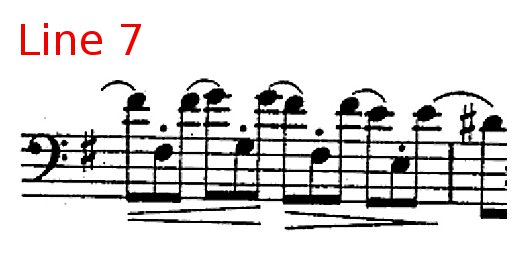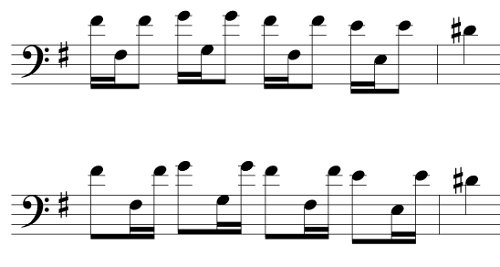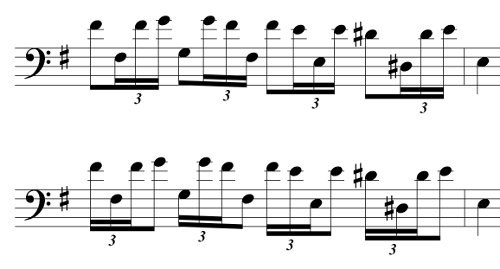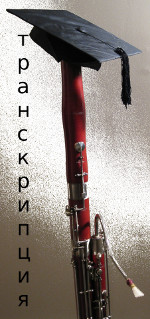Weissenborn Opus 8/2, Study #19for advanced bassoon students.
Further rhythmic practice including rhythms that break triplet
groupings. Guest performer Genesis Neely. By Terry B. Ewell, Bassoon
Digital Professor. Translated by Elena Iakovleva.
Изучение этюда Вайссенборна № 19, BDP Nº 127
Вайссенборн Опус 8/2, этюд № 19 для продвинутых студентов
фаготистов. Дополнительные занятия над ритмам, включая ритмы,
которые разделяют группировку триолей. Приглашенная исполнительница,
Genesis Neely. Терри Б. Юэлл, Цифровой Профессор Фагота. Перевод, Елена
Яковлева.
TUTORIAL Руководство
1. Welcome, this is Terry Ewell.
Study 19 is like a marathon! It demands concentration to accurately
perform all the notes all the way to the end. Furthermore the performer
does so with depleted oxygen levels because the breaths are spaced so
far apart. It is quite a challenge to perform this study with accuracy
while breathing only in the places indicated.
1. Добро пожаловать, это Терри Юэлл. Этюд № 19 - это как марафон!
Требуется концентрация, чтобы точно исполнить все ноты до самого конца.
Кроме того, исполнитель делает это с истощенными уровнями кислорода,
потому что дыхание расположено очень редко. Достаточно сложно сыграть
этот этюд аккуратно, дыша только в указанных местах.
2. In addition to practicing short sections with sprints, beat
displacement with rhythms can help mastery of this study. For example
here are the two obvious beat divisions with rhythms starting in line 7:
2. В дополнение к занятию спринтами на коротких кусках, смещение
доли может помочь овладеть этим этюдом. Например, вот два очевидных
деления доли с ритмами, начинающимися в седьмой строчке:


3. However, for even greater mastery try imposing a pattern of
four notes over the triplets:
3. Однако для еще большего мастерства попробуйте группировать триоли по четыри ноты:

REFLECTION沉思
A. … he goes before them; and the sheep follow him,
for they know his voice. (NKJV, John 10:4)
A. .… он идет перед ними; и овцы следуют за ним, потому что знают голос его. (Иоанна 10: 4)
B. This is the second of three reflections on hearing God’s
voice. If you have not listened to the first reflection contained in
the video on Weissenborn study #18 I encourage you to do so now.
B. Это второе из трех размышлений о Божьем голосе. Если вы не
прослушали первое размышление, в видео о этюде Вейссенборна №18, я
призываю вас сделать это сейчас.
C. Here are some further summaries of the article by Harry
Leesment. These comments help to clarify the difference between
God’s voice and the destructive voices of adversaries.
C. Вот некоторые дополнительные мысли из статьи Гарри Лисмента. Эти
комментарии помогают прояснить разницу между голосом Бога и
деструктивными голосами противников.
4. Forget the past vs. remember the past. God
forgives our sins, our mistakes. The adversary loves to replay
“videos” of our past wrong doings.
4. Забудьте о прошлом. Бог прощает наши грехи, наши ошибки.
Противник любит воспроизводить «видео» наших прошлых
неправильных поступков.
5. Attraction to God vs. rejection. The
Spirit of God pulls us toward God. Evil forces convince
people that they are unworthy and rejected by God.
5. Привлечение к Богу. Дух Божий тянет нас к Богу. Злые силы убеждают людей в том, что они недостойны и отвергнуты Богом.
6. Rightly brings the Bible vs. distorts the
Bible. The Spirit of God is given to help us understand
the Bible. Adversaries, however, want to twist the words and their
meanings.
6. Справедливо приводит Библию. Дух Божий дан, чтобы помочь нам
понять Библию. Однако противники хотят искажать слова и их
значения.
7. Draws you into fellowship vs. isolates. God
wants a family, a community of those who believe in Him. The
adversaries want loners who are easy to destroy.
7. Привлекает вас к общению. Бог хочет семью, общество тех, кто
верит в Него. Противники хотят одиночек, которых легко уничтожить.
CREDITS
Harry Leesment, The Evidence
(November/December 1985): 33.



